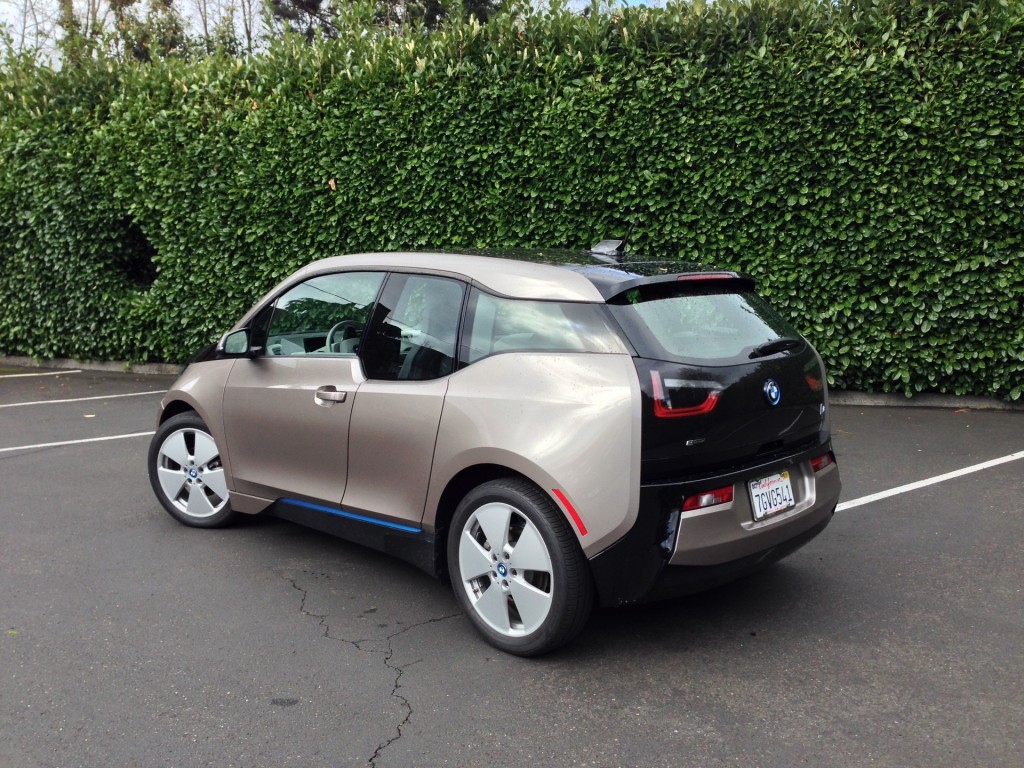The BMW i3 electric car may be the most ambitious small car of recent years, bristling with new technology and innovation.
Its carbon-fiber reinforced plastic body shell rides on an aluminum platform, and its all-electric powertrain may include an optional small engine.
The battery-electric i3 also happens to be the most energy-efficient vehicle of the many hundreds sold in the U.S. this year.
DON'T MISS: The '1,000-MPG' BMW i3: 56,000 miles on 50 gallons of gas
That optional range extender (REx for short) is used solely to power a generator that delivers electricity to the battery and the traction motor that actually power the car.
That makes the BMW i3 REx a series hybrid, operating differently than the much more common power-split hybrids that range from the conventional Toyota Prius to the plug-in hybrid Chevrolet Volt.
But the 0.65-liter two-cylinder range extender, with a maximum output of only 34 horsepower, has its limitations.

2015 BMW i3 REx - Driven, Portland OR, April 2015
Under a specific and fairly rare set of driving circumstances, it can't provide enough current to the battery and motor to maintain the car's speed under high loads.
This author experienced that phenomenon when driving an i3 REx on a cool night (using seat heaters and lights) when traveling uphill at a steady 70 mph on a highway grade that lasted several miles.
With the battery already depleted and the i3 running in range-extending mode, the car gradually slowed to 45 mph until the grade ended.
ALSO SEE: BMW i3 REx electric-car lawsuit: range-extender power loss alleged
Other i3 REx owners have experienced similar power losses, always when the car is operating at the very outside of its performance envelope, and usually at highway speeds over 50 mph, when aerodynamic drag increases exponentially.
The occasional power loss has led to a class-action lawsuit by some owners, who allege that it can slow to speeds of 45 mph on highways, without warning, creating a safety hazard for drivers and passengers.
This behavior and the lawsuit it inspired tends to produce heated, sometimes rancorous, debate between i3 advocates and those who see it as not only a disqualifying factor for i3 REx viability but also a morally reprehensible hazard that should never have been put on the market.
![2015 BMW i3 REx fast-charging at Marriott Inn, Santa Ynez, California [photo: Jeff Pantukhoff] 2015 BMW i3 REx fast-charging at Marriott Inn, Santa Ynez, California [photo: Jeff Pantukhoff]](https://images.hgmsites.net/lrg/2015-bmw-i3-rex-fast-charging-at-marriott-inn-santa-ynez-california-photo-jeff-pantukhoff_100539644_l.jpg)
2015 BMW i3 REx fast-charging at Marriott Inn, Santa Ynez, California [photo: Jeff Pantukhoff]
For an informed account of how this plays out in real use, a June blog post by a former BMW "Electronaut" and driver of an early BMW i3 REx looks at the range-extended electric i3's pros and cons.
In it, author Chris calls the i3's range extender "the little engine that sorta could."
It's worth reading his post completely, to understand how an i3 REx owner—and, let's be clear, Chris loves his car, which he's named "Serenity"—has made his peace with a fairly major limitation of its performance.
CHECK OUT: BMW i3 Electric Car: Why California Set Range Requirements, Engine Limits
Chris, on the other hand, routinely visits a family house in upstate New York that requires a 2,300-foot climb up mountainous two-lane roads. His REx routinely reaches its limits and slows the car until the end of the trip.
"It seems there is no getting around that the REx just can't get me up the mountain without a struggle," he writes.
"Granted, it does get me to my destination—and that is key—but as a driver you have got to be ready for a loss of power."
![2014 BMW i3 REx fast-charging at Chargepoint site, June 2016 [photo: Tom Moloughney] 2014 BMW i3 REx fast-charging at Chargepoint site, June 2016 [photo: Tom Moloughney]](https://images.hgmsites.net/lrg/2014-bmw-i3-rex-fast-charging-at-chargepoint-site-june-2016-photo-tom-moloughney_100557789_l.jpg)
2014 BMW i3 REx fast-charging at Chargepoint site, June 2016 [photo: Tom Moloughney]
On the other hand, Tom Moloughney, another early BMW i3 REx owner, has now put 56,000 miles on his car (using just 50 gallons of gas) and says that he's never experienced the power loss.
It's fair to say Moloughney is a strong advocate for the i3, BMW's electric cars, and electric cars in general. He too wrote a long post on his own blog about the lawsuit.
At minimum, drivers' real-world accounts and the subsequent lawsuit would seem to argue strongly that the limitations of the REx must be much better explained to owners before they get behind the wheel.
_______________________________________













